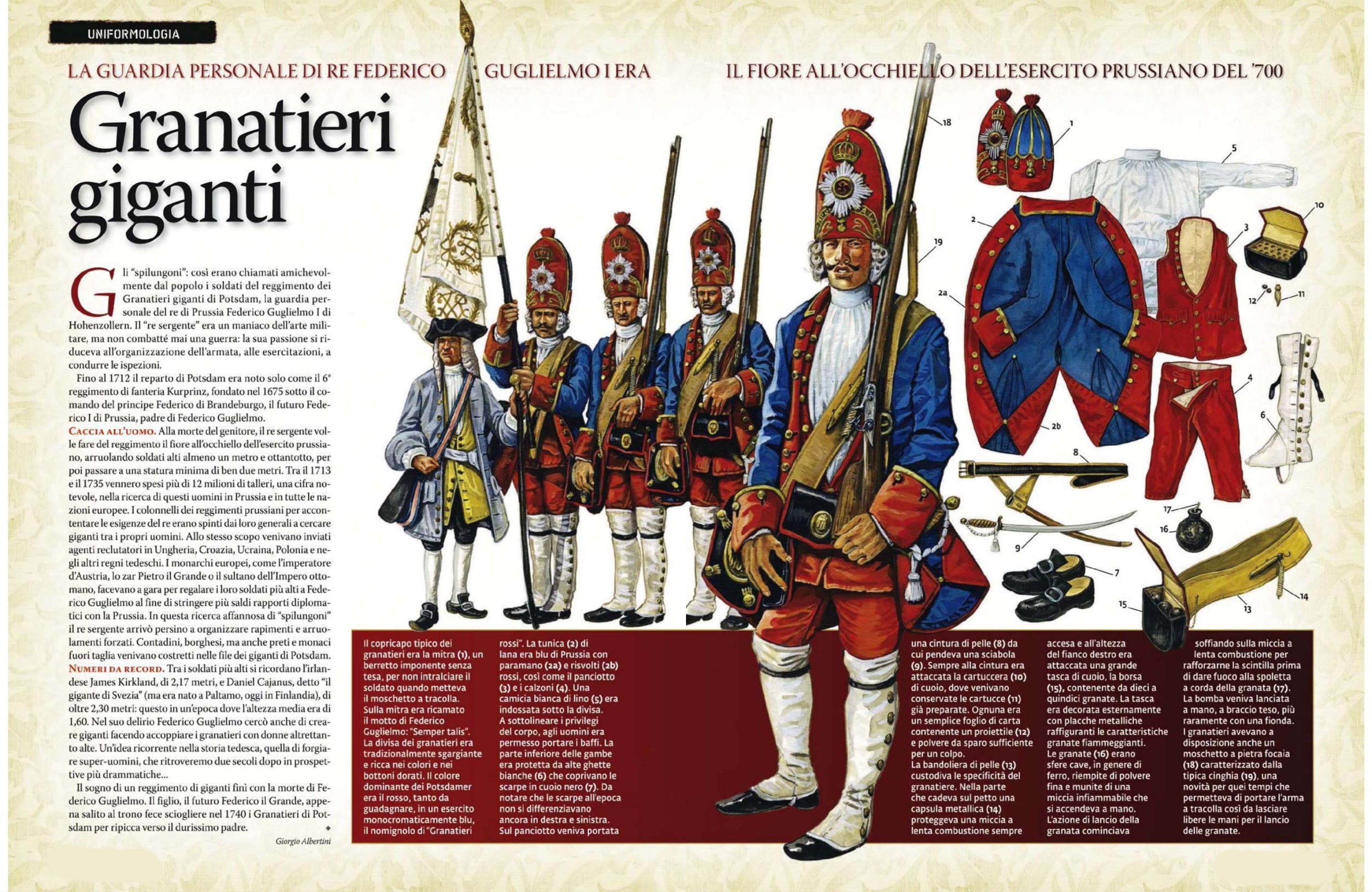
The Potsdam Giants was the Prussian infantry regiment No 6,
composed of taller-than-average soldiers. The regiment was founded in 1675 and
dissolved in 1806 after the Prussian defeat against Napoleon. Throughout the
reign of the Prussian king Friedrich Wilhelm I of Prussia (1688–1740) the unit
was known as the “Potsdamer Riesengarde” (“giant guard of Potsdam”) in German,
but the Prussian population quickly nicknamed them the “Lange Kerls” (“Long
guys”).
Frederick William I from the house of Hohenzollern became
King of Prussia in 1713.
Charles Darwin wrote that human beings, unlike livestock,
had never been forcibly bred for select characteristics, ‘except in the
well-known case of the Prussian grenadiers.’ To the amazement of fellow-rulers
and trembling subjects alike, the Soldier-King (as Frederick was nicknamed)
began to collect giant men as one would collect rare stamps. From all over
Prussia he had his agents look for- and oftentimes kidnap- men suffering from
gigantism. In striving to create his own personal soldier core of giants, the
king instructed his subjects to immediately signal the authorities whenever
they should become aware of exceptionally tall men in the vicinity. He also
made clear to his political allies that they could keep their gifts of gold for
themselves as long as they provided him now and then with fresh giants to fill
up his stock. The strange and sinister request dripped down into every segment
of Prussian society. Prussian teachers, eager to appease the morbid king, kept
an eye out for tall children and promptly handed them over to him when they had
the chance. Newborn babies, expected to grow unusually tall, were marked with a
bright red scarf for identification purposes.
If someone was unfortunate enough to be over six feet tall
and born in the Prussian sphere of influence (which was quite extensive at the
time), he would sooner or later be noticed and assigned to the king’s private
collection cabinet. Cautious parents, aware of the king’s eccentric cravings,
made improvised shelters for their children to hide them from the ever watchful
eyes of Frederick’s scouts- who feverishly roamed the land in search of
specimens to satisfy his dark avocations. If the collection item-to-be happened
to be well-to-do (or of noble descent himself) no expense was spared to acquire
him- for the king reserved enormous amounts of cash just for the purchasing of
giants. If one had the misfortune of being of modest means or descent, the
conduct of the Prussian agents was altogether different: in this case they were
given carte blanch to simply abduct the person in question, bring them before
the Prussian king to be inspected, stamped with the royal seal and subsequently
enslaved. It would sometimes occur that his agents were so eager in carrying
out their assignment that their prey would not survive the brutal journey to
the Prussian throne. This would always enrage the impatient king, and the agent
in question could count on a swift reprimand for his negligence (usually on the
unhappy end of a rifle). Some glitches aside, his collection grew steadily- and
before long he managed to assemble his giants in a formidable ‘regiment’ which
were regularly taken out on display when some befriended tyrant came to visit.
But Frederick was not satisfied with merely collecting the giants to impress
neighboring monarchs; Frederick took the whole thing to the next level.
Crossbreeding Giants
According to Washington Monthly author David Wallace-Wells,
‘King Frederick’s obsession was more than mere schoolyard eugenics.’ Indeed it
was. Frederick was not the man for silly pet projects or idle pleasures. He was
a Prussian king and that means thoroughness in absolutely every respect. With
an ambition that would put Marie Stopes to shame, he gathered from all over
Europe the most impressive ‘samples’ and selected each and every one of them
personally before sending them to his sub-level experimentation chambers. The
most notorious of these experiments was the stretching of his grenadiers on a
specially constructed rack in an attempt to make them taller than they already
were. Frederick would sometimes preside over these racking sessions himself
while enjoying his lunch at the same time. However absurd and cruel this
method, it revealed the king’s unwavering ambitions regarding all things
inhumane. One of the first to venture into the world of methodical eugenics,
king Frederick encountered the same difficulties as his future counterparts.
When it became apparent that this method resulted in the death of the giants
instead of gaining even an inch in length, he ended the practice lest he run
out of giants. But putting a halt to this racking practice could not prevent
the giants from dying in alarming numbers, for many of them sought refuge in
suicide. As only a German blueblood could devise, the king forced his rapidly
shrinking collection to interbreed with equally tall women so as to build a
future army of giants, which would be the envy of Europe’s upper-class. Here he
actually attempted to breed a ‘new man’, and it is said that the city of
Potsdam, lair of the Hohenzollerns, was littered with unusually tall men at the
end of the 18th century as a result. It is sad, this tale of the Potsdam
giants. They fell victim to the elite’s bloodthirsty appetite and unwittingly
became one of the first to be sacrificed on the altar of eugenics.